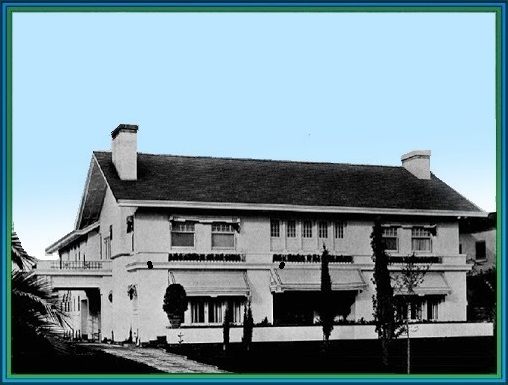
Introduction and Contents
PLEASE SEE OUR COMPANION HISTORIES
AT THE TURN OF THE 20TH CENTURY, just about every acre south and west of downtown Los Angeles was covered with barley...at least, this is the impression one gets when reading of the amazing development of the city at the time. Newspaper real estate transaction notices up to the Great Depression reveal a seemingly endless succession of new subdivisions replacing the barley, developments of every type of house, from the most basic cottage to the iconic California bungalow to the more ambitious upper-middle-class dwelling to the very largest sort built by the city's preeminent downtown oilmen, lawyers, insurance executives, and—of course—real estate investors. Of the latter was William R. Burke, who came to Los Angeles from his native Arkansas sometime before 1885. His extremely successful dealings in land culminated in his 1903 purchase of a barley field on high ground south of Washington between Western Avenue and Gramercy Place (then known as Hermosa Street in these precincts)—approximately 20 acres. Burke's original plan called for 24 lots, 12 to a side of a 120-foot-wide drive more or less in line with 22nd Street to the east.
Improvements to Burke's new development began in December 1903, and, using the best materials and craftsmanship, lasted until April 1905, with the public invited to view the results from that month. The street was to be privately owned and gated—very much along the lines of many American suburban developments of the time that followed St. Louis's pattern of Benton, Vandeventer, Westmoreland, and Portland places. Burke gave his exclusive new street the name Berkeley Square—not after or pronounced as the London square of the same spelling, but rather for the northern California town. (You don't suppose he might first have contemplated the name Burkeley Square, do you?) What Burke conjured must have been in its heyday a lovely picture of Southern California—serious houses by serious architects amid towering palms. And then it was over. The lure of Windsor Square, Hancock Park, Beverly Hills, Bel-Air, Brentwood, and Pasadena, to name a few, became too great after the landmark 1948 U.S. Supreme Court decision that ruled unconstitutional covenants precluding residency of African-Americans and other ethnicities in certain neighborhoods...the houses were aging and expensive to maintain, dark and old-fashioned and inconsistent with local architects' belated discovery of sunshine...and then the wall-like Santa Monica Freeway was aimed almost directly through the Square. The social ramifications, however, are not our primary aim here. We'd like merely to describe, post by post, what is known about each house and its occupants, to rescue the Square, as much as possible, from obscurity.
Below are illustrations that together serve as an index of posts covering the history of Berkeley Square, including those representing the 23 houses built on the 30 lots ultimately delineated when the Square opened in 1905. Clicking on the link below each picture will conjure the stories of the development and demise of the street and of the families that built and sustained this largely unknown block of residential Los Angeles for nearly 60 years, now vanished for over half a century.
Set your GPS—Brigadoon was here: The location of Berkeley Square
Aerial views of Berkeley Square, 1915-1972
A note on Berkeley Square addresses

1 Berkeley Square: The William Walden Gray House

3 Berkeley Square: The Willis Gustavus Hunt House

4 Berkeley Square: The Lee Allen Phillips House

8 Berkeley Square: The John Page Crutcher House

9 Berkeley Square: The Chester A. Montgomery / Paul Nourse House
11 Berkeley Square: The Russell McDonell Taylor House
12 Berkeley Square: The Robert D. Matthews / William B. Coberly Jr. House
14 Berkeley Square: The Walter R. Leeds / J. Kingsley Macomber House
15 Berkeley Square: The Albert Llewellyn Cheney House
17 Berkeley Square: The Horace G. Miller House

18 Berkeley Square: The Robert Phillips McReynolds House

19 Berkeley Square: The Mrs. Melville H. Hudson / Erle P. Halliburton House
24 Berkeley Square: The Francis Eugene Bacon House

25 Berkeley Square: The William Henry Davis / James S. Ricklefs House
33 Berkeley Square: The E. M. Smith House
Berkeley Hall School
NOTE: As with any such endeavor, we've found there to be numerous instances of conflicting information, spellings, and errors in original newspaper reportage as well as in photo notations by various archival institutions. We welcome any corrections or additions here—indeed, it is our hope that readers of this blog, perhaps even descendants and friends of the denizens of Berkeley Square, might possibly turn up with new or revisory information, and perhaps even actual memories.
Illustrations: Background: LAPL; Sourisseau Academy for State and Local History;
LAT; others credited in individual posts






















